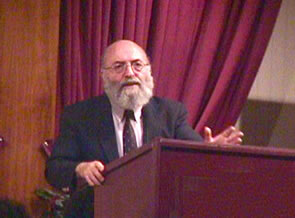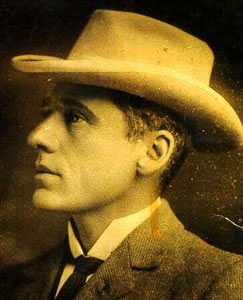De Amerikaanse schrijver Herman Harold (Chaim) Potok werd geboren in New York City op 17 februari 1929. Hij kreeg vanwege de traditie van zijn ouders na zijn geboorte ook nog de Hebreeuwse namen Chaim Tzvi (‘chaim’ betekent ‘leven’). Hij werd vooral bekend door zijn debuutroman The Chosen (De uitverkorene/De rechtvaardiging) (1967), die meteen een bestseller werd en het vervolgboek The Promise (De Belofte, 1969). The Chosen werd in 1981 verfilmd en ook bewerkt voor theater. Deze twee boeken gaan over de vriendschap tussen twee joodse jongens, waarvan de één uit een streng chassidisch milieu komt en de ander een liberale opvoeding heeft gehad. Het thema, de spanning tussen beide werelden kende Potok uit zijn eigen leven. Hij werd opgevoed in een orthodox-joods gezin. Zijn literaire aspiraties wekten veel weerstand op in zijn milieu.
Uit: The Chosen
“The world kills us! The world flays our skin from our bodies and throws us to the flames! The world laughs at Torah! And if it does not kill us, it tempts us! It misleads us! It contaminates us! It asks us to join in its ugliness, its impurities, its abominations! The world is Amalek! It is not the world that is commanded to study Torah, but the people of Israel! Listen, listen to this mighty teaching.” His voice was suddenly lower, quieter, intimate. “It is written, ‘This world is like a vestibule before the world-to-come; prepare thyself in the vestibule, that thou mayest enter into the hall.’ The meaning is clear: The vestibule is this world, and the hall is the world-to-come. Listen. In gematriya, the words ’this world’ come out one hundred sixty-three, and the words ’the world-to-come’ come out one hundred fifty-four. The difference between ’this world’ and ’the world-to-come’ comes out to nine. Nine is half of eighteen. Eighteen is chai, life. In this world there is only half of chai. We are only half alive in this world! Only half alive!”

Chaim Potok (17 februari 1929 – 23 juli 2002)
Gustavo Adolfo Bécquer werd op 17 februari 1836 in Sevilla geboren als Gustavo Adolfo Domínguez Bastida. Hij is een van de bekendste dichters uit de Spaanse romantiek. Toen hij vijf jaar oud was stierf zijn vader, een bekende schilder die groot aanzien genoot. Nog geen vijf jaar daarna liet zijn moeder acht weeskinderen achter. Gustavo werd door zijn peettante in huis genomen en bleef tot 1854 in Sevilla wonen. Hij besloot literatuur te gaan studeren en zocht zijn geluk in Madrid. Hij schreef artikelen in plaatselijke kranten en tijdschriften maar succes bleef uit. Om geld te verdienen schreef hij voor de Dirección de Bienes Nacionales, maar hij werd al snel ontslagen omdat zijn baas hem betrapte bij het tekenen van scenes uit het werk van Shakespeare. Vanaf 1858 verbleef hij weer in Sevilla, waar hij door tbc en syphilis echter niet meer tot werken kwam. Zijn beroemdse werken zijn Rimas en Leyendas (Legenden) die vaak samen worden uitgegeven.
VI
Como la brisa que la sangre orea
sobre el oscuro campo de batalla,
cargada de perfumes y armonías
en el silencio de la noche vaga.
Símbolo del dolor y la ternura,
del bardo inglés en el horrible drama
la dulce Ofelia, la razón perdida,
cogiendo flores y cantando pasa.
VI
Wie die Brise, welche das Blut auslüftet
Über dem dunklen Schlachtfeld,
Beladen mit Gerüchen und Harmonien
Im Schweigen der schwerfälligen Nacht;
Symbol des Schmerzes und der Zärtlichkeit,
Am englischen Barden im schrecklichen Drama
Die sanfte Ophelia verstandesverlustig
Blumen pflückend und singend vorbeigeht.
XIII
Tu pupila es azul y cuando ríes
su claridad suave me recuerda
el trémulo fulgor de la mañana
que en el mar se refleja.
Tu pupila es azul y cuando lloras
las trasparentes lágrimas en ella
se me figuran gotas de rocío
sobre una violeta.
Tu pupila es azul y si en su fondo
como un punto de luz radia una idea
me parece en el cielo de la tarde
una perdida estrella.
XIII
Deine Pupille ist blau, und wenn Du lachst
Erinnert mich ihre sanfte Klarheit
An den zitternden Glanz des Morgens,
Der im Meer widerscheint.
Deine Pupille ist blau, und wenn Du weinst
Bilden die durchsichtigen Tränen in ihr
Tropfen von Tau
Über einem Veilchen.
Deine Pupille ist blau, und wenn auf ihrem Grund
Eine Idee wie ein Lichtpunkt ausstrahlt
Erscheint mir im Abendhimmel
Ein verlorener Stern!
Vertalingen door Arne-Wigand Baganz

Gustavo Adolfo Bécquer (17 februari 1836 – 22 december 1870)
De Duitse schrijver Georg Britting werd op 17 februari 1891 geboren in Regensburg. In 1914 trok meldde hij zich als vrijwilliger voor het leger. Daarna ging hij naar München en begon hij met schrijven. Hij was uitgever van «Die Sichel», een tijdschrift voor literatuur en grafiek. Hij schreef toneelstukken, een roman en talrijke gedichten en verhalen. Hij ontving o.a. de Immermann-Preis, 1959 het Bundesverdienstkreuz, 1961 en de Große Preis von Nordrhein-Westfalen.
Mitten im Föhrenwald
Der Schnee fiel nicht mehr, aber die Wolken hingen
Ober den Wald.
Der Fuchs umschlich witternd die heimtückisch treuherzigen Schlingen,
Der Rabe saß auf dem Föhrenast, blinzelnd, großväteralt.
Das Eichhörnchen lockte es, über den gefrorenen Weiher zu springen,
Die Luft war silbern und kalt.
Die blaue Eisdecke fing an zu singen,
Und der Mond sah gelb aus dem Wolkenspalt.
Vorm Tor der Scheune, im wollnen, geringen
Janker stand Josef und hatte die Fäuste geballt,
Und seine Ohren, die geschärften, wachsamen, empfingen
Jeden Laut, und plötzlich hat er breit und befreit übers bärtige Antlitz gestrahlt.
Das Eichhörnchen rief er an, den Raben, den Fuchs, und vor allen Dingen
Das gelbe Gesicht, das über der Waldlichtung hing, den Mond, kreisrund von Gestalt.
Und er hob die Arme, als wolle er sie alle umschlingen,
Denn er hatte einen seligen Seufzer vernommen,
Und er schrie: Freut euch mit mir, ihr Tiere, ihr frommen,
Maria ist niedergekommen
Mitten im Föhrenwald!
Und das Eichhörnchen stellte schräg den brennroten Schwanz,
Und der Fuchs nieste höflich und kam Josef sehr nah.
Der Rabe wackelte am Ast einen steifen Tanz,
Und eine Sternschnuppe fiel und sang zwitschernd: Halleluja!
Der Mond ging so tief herab, daß er Josef gelbäugig ins Auge sah,
Und Josef im Janker lachte und in der Scheune ganz
Leis lachte Maria.

Georg Britting (7 februari 1891- 27 april 1964)
De Australische dichter Andrew Barton “Banjo” Paterson werd geboren op 17 februari 1864 in Narambla in New South Wales. Hij schreef veel ballades en gedichten over het leven in het Australische achterland, de outback. Een van zijn beroemdste gedichten is “Waltzing Matilda”. Het gedicht werd op muziek gezet, en werd vervolgens een van de populairste Australische liedjes. Andere gedichten zijn onder andere “The Man From Snowy River”, waarop een film en een TV serie werden gebaseerd, en “Clancy of the Overflow”, het verhaal over een “drover” (iemand die verantwoordelijk was om kuddes vee over lange afstanden naar een markt te brengen). Patersons gedichten gaven een erg romantische kijk op het leven in de outback. Paterson zelf woonde in de stad, en werkte als een advocaat.
Waltzing Matilda
Once a jolly swagman camped by a billabong,
Under the shade of a coolibah tree,
And he sang as he watched and waited ’til his billy boiled
“Who’ll come a-Waltzing Matilda, with me?”
Waltzing Matilda, Waltzing Matilda
Who’ll come a-Waltzing Matilda, with me
And he sang as he watched and waited ’til his billy boiled
“Who’ll come a-Waltzing Matilda, with me?”
Down came a jumbuck to drink from the billabong,
Up jumped the swagman and grabbed him with glee,
And he sang as he stowed that jumbuck in his tucker bag,
“You’ll come a-Waltzing Matilda, with me”.
Waltzing Matilda, Waltzing Matilda
“You’ll come a-Waltzing Matilda, with me”
And he sang as he stowed that jumbuck in his tucker bag,
“You’ll come a-Waltzing Matilda, with me”.
Up rode the squatter, mounted on his thoroughbred,
Down came the troopers, one, two, three,
“Where’s that jolly jumbuck you’ve got in your tucker bag?”
“You’ll come a-Waltzing Matilda, with me”.
Waltzing Matilda, Waltzing Matilda
“You’ll come a-Waltzing Matilda, with me”
“Where’s that jolly jumbuck you’ve got in your tucker bag?”,
“You’ll come a-Waltzing Matilda, with me”.
Up jumped the swagman, leapt into the billabong,
“You’ll never catch me alive,” said he,
And his ghost may be heard as you pass by the billabong,
“Who’ll come a-Waltzing Matilda, with me”.
Waltzing Matilda, Waltzing Matilda
Who’ll come a-Waltzing Matilda, with me
And his ghost may be heard as you pass by t
he billabong,
“Who’ll come a-Waltzing Matilda, with me?”

Andrew Paterson (17 februari 1864 – 5 april 1941)
De Britse schrijfster Ruth Rendell werd geboren als Ruth Grasemann in Londen op 17 februari 1930. Ze heeft de bijnaam “Queen of Crime” en schrijft ook wel onder het pseudoniem Barbara Vine. Ze werkte aanvankelijk als journalist voordat ze in 1964 haar eerste roman schreef. Ze wordt vooral geroemd om haar taalgebruik en de diep uitgewerkte karakters. Ook zijn in haar boeken de sociale veranderingen te zien. Zo besteedt ze in haar recentere boeken aandacht aan de veranderde sociale status van vrouwen en huiselijk geweld. Voor haar werk heeft ze veel prijzen gekregen. In 1997 kreeg ze de niet-erfbare titel barones. Ze zit in het House of Lords namens de Labour Party.
Uit: Adam and Eve and Pinch Me
“Sonovia always said “being in the force,” never “being a policeman.” Minty was disappointed about the car but didn’t say so. She missed being taken about in Jock’s car, though it was old and what he called a “boneshaker.” Laf came out from the front room and gave her a kiss. His name was Lafcadio but that was a bit much of a name to go to bed with, as Sonovia put it, and everyone called him Laf. He and Sonovia were still only in their late forties but had been married since they were eighteen and had four grown-up children, who’d all left home now and either had their own places or were still at university. Auntie used to say you’d think no one else had ever had a son a doctor and a daughter a lawyer, another daughter at university, and the youngest at the Guildhall School of something or other, the way Sonovia went on about it. Minty thought it was something to be proud of but at the same time couldn’t really comprehend it; she couldn’t imagine all the work and study and time that had gone into getting where they had.
“I’ve seen a ghost,” she said. “When I got in from work. In the front room, sitting in a chair. It was Jock.

Ruth Rendell (Londen, 17 februari 1930)
